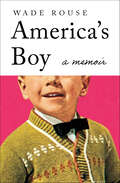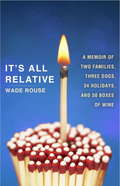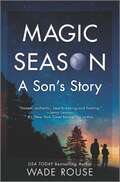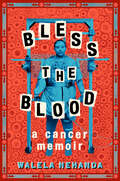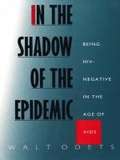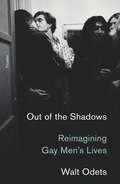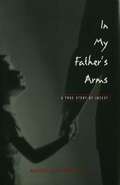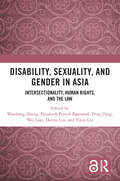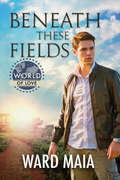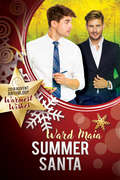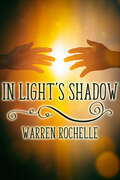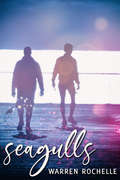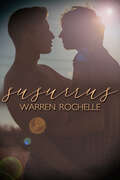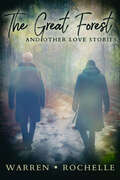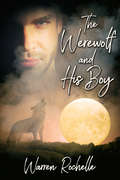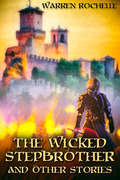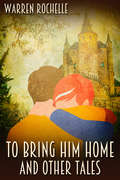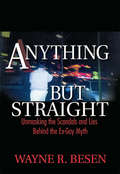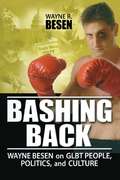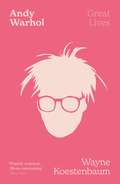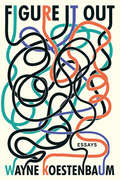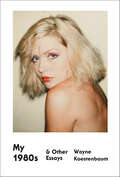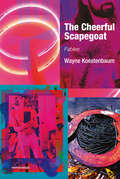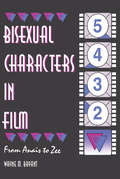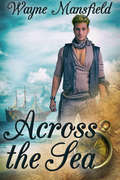- Table View
- List View
America's Boy: A Memoir
by Wade Rouse&“A revelatory story about acceptance, pride, and the many ways even a seemingly prejudiced family can surprise us&” by the bestselling author of Magic Season (The Washington Post).Indie Next List &“Great Read&” SelectionAmerican Library Association&’s Inaugural &“Rainbow List&” Selection In this memoir, writer and journalist Wade Rouse delivers a humorous and heartwarming account of his Midwestern childhood and coming of age as a gay man. Born in Granby, a small farm town in the southwest Missouri Ozarks, Wade was a fish out of water as long as he could remember—or at least since he participated in his family&’s mock Miss America pageant when he was just five years old, clad in his grandmother&’s red &“whore&” heels and his mother&’s black-and-white polka-dot bikini. Life didn&’t get easier in Wade&’s conservative hometown, especially after his older brother died just a month after Wade graduated junior high school. It was then that Wade buried his brother—and his sexuality, so his parents wouldn&’t mourn the loss of a second son. Finally, after years of a descent into obsessive-compulsive behaviors and overeating, Wade was able to come out to himself, losing weight and gaining confidence until he had nothing left to hide. Filled with memories of happiness and heartbreak, America&’s Boy is both &“a quirky tribute to [Rouse&’s] rural Ozark family, and an easily digestible, homespun tale of a bygone era in Middle America&” (Time Out Chicago).&“A storyteller and a memoirist in the best sense of the words. . . . Reading Rouse&’s memoir is more like sitting with a good friend and a cold beer, trading stories and remembering those things that may have been painful or tragic at the time, but must now be respected for what they are.&” —Metro Weekly
It's All Relative: Two Families, Three Dogs, 34 Holidays, and 50 Boxes of Wine (A Memoir)
by Wade RouseHow come the only thing my family tree ever grows is nuts?" Wade Rouse attempts to answer that question in his blisteringly funny new memoir by looking at the yearly celebrations that unite us all and bring out the very best and worst in our nearest and dearest. Family is truly the only gift that keeps on giving--namely, the gifts of dysfunction and eccentricity--and Wade Rouse's family has been especially charitable: His chatty yet loving mother dresses her sonas a Ubangi tribesman, in blackface, for Halloween in the rural Ozarks; his unconventional engineer ofa father buries his children's Easter eggs; his marvelouslyMartha Stewart-esque partner believes Barbie is his baby; his garage-sale obsessed set of in-laws areconvinced they can earn more than Warren Buffett by selling their broken lamps and Nehru jackets; hismutt Marge speaks her own language; and his oddball collection of relatives includes a tipsy Santa Clauswith an affinity for showing off his jingle balls. In the end, though, the Rouse House gifted Wade with love,laughter, understanding, superb comic timing, and a humbling appreciation for humiliation. Whether Wade dates a mime on his birthday to overcome his phobia of clowns or outruns a chubchasing boss on Secretary's Day, he captures our holidays with his trademark self-deprecating humor and acerbic wit. He paints a funny, sad, poignant, andoutlandish portrait of an an all-too-typical family that will have you appreciating--or bemoaning--yourown and shrieking in laughter.From the Hardcover edition.
Magic Season: A Son's Story
by Wade Rouse"Honest, authentic, heartbreaking and healing. I devoured it in one day."—Jenny Lawson, #1 New York Times bestselling author Bestselling author Wade Rouse finds solace with his dying father through their shared love of baseball in this poignant, illuminating memoir of family and forgiveness.Before his success in public relations, his loving marriage and his storied writing career, Wade Rouse was simply Ted Rouse's son. A queer kid in a conservative Ozarks community, Wade struggled at a young age to garner his father's approval and find his voice. For his part, Ted was a hard-lined engineer, offering little emotional support or encouragement. But Wade and Ted had one thing in common: an undying love of the St. Louis Cardinals.For decades, baseball offered Wade and his father a shared vocabulary—a way to stay in touch, to connect and to express their emotions. But when his father's health takes a turn for the worst, Wade returns to southwest Missouri to share one final season with his father. As the Cards race towards a dramatic pennant race, Wade and his father begin to open up in way they never thought possible. Together, inning by inning during their own magic season, they'll move towards forgiveness, reconciliation, and peace.Heartfelt, hilarious and lovingly rendered, Magic Season is an unforgettable story of love, family and forgiveness against the backdrop of America's favorite pastime.
Bless the Blood: A Cancer Memoir
by Walela NehandaA searing debut YA poetry and essay collection about a Black cancer patient who faces medical racism after being diagnosed with leukemia in their early twenties, for fans of Audre Lorde's The Cancer Journals and Laurie Halse Anderson's Shout.When Walela is diagnosed at twenty-three with advanced stage blood cancer, they're suddenly thrust into the unsympathetic world of tubes and pills, doctors who don&’t use their correct pronouns, and hordes of "well-meaning" but patronizing people offering unsolicited advice as they navigate rocky personal relationships and share their story online.But this experience also deepens their relationship to their ancestors, providing added support from another realm. Walela's diagnosis becomes a catalyst for their self-realization. As they fill out forms in the insurance office in downtown Los Angeles or travel to therapy in wealthier neighborhoods, they begin to understand that cancer is where all forms of their oppression intersect: Disabled. Fat. Black. Queer. Nonbinary.In Bless the Blood: A Cancer Memoir, the author details a galvanizing account of their survival despite the U.S. medical system, and of the struggle to face death unafraid.
In the Shadow of the Epidemic: Being HIV-Negative in the Age of AIDS
by Walt OdetsFor gay men who are HIV-negative in a community devastated by AIDS, survival may be a matter of grief, guilt, anxiety, and isolation. In the Shadow of the Epidemic is a passionate and intimate look at the emotional and psychological impact of AIDS on the lives of the survivors of the epidemic, those who must face on a regular basis the death of friends and, in some cases, the decimation of their communities. Drawing upon his own experience as a clinical psychologist and a decade-long involvement with AIDS/HIV issues, Walt Odets explores the largely unrecognized matters of denial, depression, and identity that mark the experience of uninfected gay men.Odets calls attention to the dire need to address issues that are affecting HIV-negative individuals--from concerns about sexuality and relations with those who are HIV-positive to universal questions about the nature and meaning of survival in the midst of disease. He argues that such action, while explicitly not directing attention away from the needs of those with AIDS, is essential to the human and biological well-being of gay communities. In the immensely powerful firsthand words of gay men living in a semiprivate holocaust, the need for a broader, compassionate approach to all of the AIDS epidemic's victims becomes clear. In the Shadow of the Epidemic is a pathbreaking first step toward meeting that need.
Out of the Shadows: Reimagining Gay Men's Lives
by Walt OdetsA moving exploration of how gay men construct their identities, fight to be themselves, and live authenticallyIt goes without saying that even today, it’s not easy to be gay in America. While young gay men often come out more readily, even those from the most progressive of backgrounds still struggle with the legacy of early-life stigma and a deficit of self-acceptance, which can fuel doubt, regret, and, at worst, self-loathing. And this is to say nothing of the ongoing trauma wrought by AIDS, which is all too often relegated to history. Drawing on his work as a clinical psychologist during and in the aftermath of the epidemic, Walt Odets reflects on what it means to survive and figure out a way to live in a new, uncompromising future, both for the men who endured the upheaval of those years and for the younger men who have come of age since then, at a time when an HIV epidemic is still ravaging the gay community, especially among the most marginalized.Through moving stories—of friends and patients, and his own—Odets considers how experiences early in life launch men on trajectories aimed at futures that are not authentically theirs. He writes to help reconstruct how we think about gay life by considering everything from the misleading idea of “the homosexual,” to the diversity and richness of gay relationships, to the historical role of stigma and shame and the significance of youth and of aging. Crawling out from under the trauma of destructive early-life experience and the two epidemics, and into a century of shifting social values, provides an opportunity to explore possibilities rather than live with limitations imposed by others. Though it is drawn from decades of private practice, activism, and life in the gay community, Odets’s work achieves remarkable universality. At its core, Out of the Shadows is driven by his belief that it is time that we act based on who we are and not who others are or who they would want us to be. We—particularly the young—must construct our own paths through life. Out of the Shadows is a necessary, impassioned argument for how and why we must all take hold of our futures.
In My Father's Arms: A Son's Story of Sexual Abuse
by Walter A. DemillyTo the outside world, Walter de Milly’s father was a prominent businessman, a dignified Presbyterian, and a faithful husband; to Walter, he was an overwhelming, handsome monster. This paperback of In My Father’s Arms: A True Story of Incest adds a reflective preface by the author and a foreword by Richard B. Gartner, PhD, author of Beyond Betrayal: Taking Charge of Your Life after Boyhood Sexual Abuse.
Disability, Sexuality, and Gender in Asia: Intersectionality, Human Rights, and the Law
by Wanhong Zhang, Elisabeth Perioli Bjørnstøl, Peng Ding, Wei Gao, Hanxu Liu and Yijun LiuThis book introduces experiential knowledge of the intersectionality of disability, sexuality, and gender equality issues. Scholars and disabled persons’ organizations in different Asian countries such as China, Vietnam, Myanmar, Nepal, and Japan have contributed to the book. It is a preliminary introduction of the frontline practice of Asian disability activism and the experience of women and LGBTIQ people with disabilities. It presents the direct participation of disability advocates in mapping how both women with disabilities and LGBTIQ individuals with disabilities realize their rights such as identity, work rights, personal safety, and sexual rights. Studies presented here explore the experience of empowering diverse disability groups and advocating for equality and non-discrimination. It explains how to use the leverage of the Convention on the Rights of Persons with Disabilities (CRPD) for further human rights campaigns in a broader context for disadvantaged groups. This collection is the product of a participatory research project, which aims to increase the capabilities of local disabled persons’ organizations and NGOs in utilizing human rights laws and encourage dialogue and collaboration between academia, people with disabilities, and human rights advocates. It will be essential reading for academics, researchers, policy-makers, and campaign groups.
Beneath These Fields (World of Love)
by Ward MaiaSometimes true worth is well hidden. Ellis Campos is a successful divorce lawyer with little to no time for a personal life. His predictable routine is disrupted when he inherits a coffee farm from an estranged aunt. There’s no room in his life for all the complications that come with managing a farm in another state. But his plans to quickly sell it and go back to the big city fall apart when he’s manipulated into spending a week on the estate. Adding to the unexpected surprises, he meets Rudá, a native Brazilian who works on the farm, and while teaching him about his aunt’s home and family, also tempts Ellis like no one ever has. He doesn’t expect his life to change in such a short time, but as he finds value and comfort in the farm’s routine, Ellis quickly realizes that, like the land itself, Rudá has secrets that could send him running back to Rio.World of Love:Stories of romance that span every corner of the globe.
Summer Santa (2018 Advent Calendar - Warmest Wishes)
by Ward MaiaSam is a journalist struggling with the recent transfer to his magazine’s Brazilian office. He doesn’t speak the language and isn’t all that familiar with the customs. It also isn’t easy to make friends when you’re the new guy. Then there’s James, his friendly and gorgeous coworker, who is so out of Sam’s league, he knows he doesn’t stand any chance with the handsome Brazilian. Just as Sam is preparing to spend Christmas away from his family, an unexpected surprise spins his lonely holiday plans around. Another unforeseen gift is James’s offer to show Sam some of the city’s holiday traditions. With his significant low self-esteem, Sam doesn’t know what to make of James’s offer and apparent interest. Can some last-minute decorations and an impromptu meal make Sam’s apartment feel more homely? Maybe everything could come together in a wonderful way—if Sam can find the courage and confidence to accept all James wants to give.A story from the Dreamspinner Press 2018 Advent Calendar "Warmest Wishes."
In Light's Shadow
by Warren RochelleGavin Booker, a school librarian, leads an orderly, normal life. Work, jogging, friends from work, his son every other weekend. Gavin is also a secret. He is a hybrid, or part-fairy. And in the Columbian Empire, hybrids are under an automatic death sentence.In this alternate version of the USA, magic is illegal. So is loving another man. Fairies are locked away in ghettoes, and magical beasts, such as gryphons, unicorns, and pegasi, are kept in zoos. The others, tree and water spirits, talking beasts, fauns, and the rest, are in hiding.This is the world in which Gavin grew up. He survived, thanks to his mother. He can never forget he is different: ministers preach against people like him constantly. Hating the other is a part of every school’s curriculum.But things are changing fast, and seemingly for the worst. Earthquakes, volcanoes, killer storms are frequent occurrences. The medicine Gavin takes to suppress his body’s glow isn’t working. The spells cast by his doctor, a witch, are losing their power. If anyone finds out what Gavin is, he is dead.The Empire always goes after its marginalized people. Can Gavin survive the coming catastrophe? Will he ever recover from losing the boys he loved earlier in life? Can he find the fairy man who has haunted his dreams before it is too late?
Seagulls
by Warren RochelleSometimes, we get second chances -- at love, to make things right, to say good-bye the way it should have been said. Darian promised his dying husband Randy he would go through with the plan to teach summer school in Bath, England. Randy insisted; it was always Darian’s dream to live in England, go, do it. But once there, in Tintagel, on a street in Coverack, a small Cornish seaside village, Darian sees Randy. Grief can make us see things, right?So Darian tells himself, until the man whom he buried, whose ashes he carried with him to England, sits down beside him on a bench in front of Bath Abbey, with screaming seagulls nearby. It seems the dead can come back. But why and how? Has Randy come to take Darian with him? Or is something else going?
Susurrus
by Warren RochelleVaron Cambeul has made it to the top: Royal Magician of the Kingdom of Lothia, at the right hand of the king, who is his lover. He has always kept the promise he made to his mother and his apprenticeship master: he has used his magic for good.This promise is tested when the king asks him to make a curse that will be cured by the king so everyone will love him. Helping the king is using his magic for good, right? But is Varon doing this because he has fallen in love with the king? What about those who will suffer from the curse and slowly be transformed into ghosts, people like Theo and Russell in the town where the curse is released?Can Varon undo this great wrong? Can he save Theo and Russell and the others as they turn invisible? How can he love someone who is not doing good?
The Great Forest and Other Love Stories
by Warren RochelleWe all want to be loved, and to love. But finding true and lasting love is not always easy, and sometimes comes at a cost. Sometimes, love hurts. Sometimes, the obstacles separating us from true love may seem insurmountable. In this collection by best-selling gay fantasy author Warren Rochelle, love is found next door as well as twelve lightyears away.In the title story, Edvard is the accident, the unplanned child. His mother is the Ambassador of the Human Community to the Great Forest on the planet Wertynger, a forest of sentient trees. His father is the Embassy’s chief legal counsel. His golden brothers are on other worlds in the Human Community, bound for success. Not Edvard, to the despair of his parents. When he meets Luc, who loves Ed for who he is, everything changes. His parents separate them, sending Edvard to school lightyears away on Earth. Ed promises to come back and marry Luc. When Luc is taken by the minions of the Holy Trees, their love is sorely tested. Happily ever after is no longer certain. It may even be impossible.Throughout other stories, love is tested in many ways. Can a man trust a mysterious voice on the radio, calling for him? What if your lover asks you to make a curse? Or if your husband is hearing voices in his dreams, voices somehow connected to a comet? Can promises made in one universe be kept in another? Will these lovers have a happily ever after, or at least, for now?
The Werewolf and His Boy
by Warren RochelleTheir leap of faith could unleash magic ... or plunge them into darkness.Henry Thorn has worked at Larkin's since graduating high school. He likes it -- especially when he can use his secret skill of hiding inside shadows so his boss can't find them. Without that talent, he would never had survived growing up different.When a hire enters the store, Henry's other latent talent kicks in. He can smell an emotional response even before he lays eyes on the redhead.Jamey Currey came out, and his conservative parents promptly kicked him out. He, too, is different -- he senses Henry's attraction the moment they met. The first time they kiss, torrential rains fall from skies split by lightning.Their kiss also awakens the Watchers, diabolical hunters who will stop at nothing -- even extermination -- to keep magic suppressed. With the help of a friendly coven of friendly witches, the boys embark on a quest to discover an ancient key to restoring magic to the world, and to understand mysteries of their own hearts.The question is, will this quest cost them their lives?
The Wicked Stepbrother and Other Stories
by Warren RochelleFairy tales. Prince Charming fights evil, wins the princess, lives happily ever after. Three sons, three wishes, witches, dragons, a quest, and happily ever after.These stories are part of our cultural fabric. The stories change in retellings to reflect contemporary culture, such as Princess Charming, or heroes and heroines as people of color. In this collection, queer characters take center stage in stories that grew out of questions:What if the prince falls in love with Cinderella's gay stepbrother? What if Rumpelstiltskin doesn't really want the Queen's child but rather the King himself? What if Beauty and the Beast are two men?These stories explore metaphors of magic and the magical, this time, with a gay perspective. What price must be paid for happily ever after? Duty or love? Is love worth great sacrifice? Once upon a time ...
To Bring Him Home and Other Tales
by Warren RochelleHome, a place where we belong and are safe and loved. Home, the house in which we grew up, a neighborhood, a culture, even a country. Home is a state of mind, it is a place of the heart, and in the heart.Finding home, coming home, and bringing home the one we love is a journey, a journey that can be a dangerous adventure. For the lovers in these stories, adventures can include quests and fighting dragons and demons, past and present, physical as well as mental and emotional. Rocket launchers need to be dodged, the Wild Hunt needs to be outrun. For some of the lovers here, home has been lost, or they have been forced to leave, as is too common for LGBT+ youth.In this collection queer positive speculative fiction stories, explore the idea of what and where home is in the lives of these lovers. Will they survive their quests, defeat their monsters? Will they find a place to call home?
Anything but Straight: Unmasking the Scandals and Lies Behind the Ex-Gay Myth
by Wayne BesenThe real story behind "ex-gay" ministries and reparative therapy! Nationally known activist Wayne Besen spent four years examining the phenomenon of "ex-gay" ministries and reparative therapies-interviewing leaders, attending conferences, and visiting ministries undercover as he accumulated hundreds of hours of research. The result is Anything but Straight: Unmasking the Scandals and Lies Behind the Ex-Gay Myth, a groundbreaking exposé of the controversial movement that's revered by independent religious groups and reviled by gay and lesbian organizations. The book presents a historical perspective on the dispute, examining "ex-gay" groups such as Love In Action, Exodus International, Homosexuals Anonymous, and profiling a cast of characters that includes Pat Robertson, the Rev. Jerry Falwell, "ex-gay" poster boy John Paulk, National Association of Research and Therapy of Homosexuality activist Richard Cohen, and psychiatrist Dr. Robert Spitzer. An in-depth, well-researched, and historically significant account, Anything but Straight is full of startling facts and alarming surprises. The original content and novel material in the book includes: a first-ever comprehensive history of the "ex-gay" ministries and "reparative therapy" the inside story of the night the author photographed "ex-gay" poster boy John Paulk inside a gay bar the author's discovery that Anne Paulk lied about being a lesbian and has admitted to having a strong attraction to men BEFORE she became "ex-gay" previously undisclosed bizarre techniques used by the "ex-gay" ministries and "reparative therapists" the author's exclusive in-depth interviews with leading "ex-gay" leaders-they disclose their deepest secrets, hidden desires, and true motivations an extraordinary new study that shows that most "ex-gay" leaders have suffered from substance abuse or severe emotional problems-while many "ex-gay" leaders claim they were "unhappy being gay," this report helps prove that their dissatisfactions came not from their homosexuality, but from poor life choices and irresponsible behavior new revelations that one of the nation's leading "reparative therapists" hailed from a secretive cult that was scandalized for practicing nude therapy From the author: Through my extensive experience, I have learned that the extraordinary claims made by the "ex-gay" groups are without merit and the efficacy of their programs is dubious at best and harmful at worst . . . One frequent question I get is, "Why can't gay activists simply leave 'ex-gay' groups alone and let them go about their business?" This is exactly what happened for nearly three decades while "ex-gay" groups labored in near anonymity. But all this recently changed when the "ex-gay" groups intricately aligned themselves with the anti-gay political agenda of the Religious Right. With "ex-gays" added to their arsenal, the Right could disingenuously claim to love gay people and offer them "hope for change," while simultaneously fighting for punitive legislation. Their insidious message: Since gays and lesbians can change, there is no need for laws that protect them against arbitrary prejudice. Anything but Straight: Unmasking the Scandals and Lies Behind the Ex-Gay Myth is an essential read for activists on both sides of the "ex-gay" fence, family members of gays and lesbians, Gay, Bisexual, Lesbian, and Transgender church members, psychiatric and social science professionals, and anyone who has dealt with "coming out" issues. An appendix of resources and a helpful bibliography make it easy to find additional information on this fascinating topic.</ul
Bashing Back: Wayne Besen on GLBT People, Politics, and Culture
by Wayne Besen RThe Best of Besen!Bashing Back: Wayne Besen on GLBT People, Politics & Culture is a compilation of 72 columns from the outspoken GLBT activist and author of Anything But Straight: Unmasking the Scandals and Lies Behind the Ex-Gay Myth. Funny, provocative, and informative, this unique book puts a progressive spin on hot-button topics in the political, cultural, and social arenas, covering everything from AIDS and African-Americans to Zach Stark.Bashing Back presents an A-to-Z look at Besen's worldview on a wide range of topics, including Bill O'Reilly, Brokeback Mountain, Ellen DeGeneres, gay pride parades, marriage rights, Mary Cheney, overhauling the gay movement, religion and politics, sports and homophobia, The Passion of the Christ, the pitiful state of TV news, the Vatican's war on gays, the World Trade Center, and New Orleans. Smart and funny, Besen delivers a knockout punch to the notion that liberalism stands for nothing and progressive means passive.From the author:"The columns I have chosen for this book touch on politics and people, comedy and culture. But most of all, they are a strong defense of the liberal values that have made this nation strong. It is time we proudly stand up for what we believe in. If we don't defend our values, our opponents will define them. . . . Bashing Back is the first punch in a fight to take back our culture and restore progressive values for the good of the nation."An excerpt from "Bill O'Reilly:"Once upon a time I actually enjoyed The O'Reilly Factor. While I almost always disagreed with him, he was at least entertaining. Lately, however, he has morphed into just another Bush mouthpiece. The master of the "No Spin Zone" is suddenly spinning so hard he is in the Twilight Zone, dizzy in his own deception. He even had the audacity on CNBC to suggest that Fox isn't a conservative news outlet. That's beyond spin. If it were closer to Hanukah I'd think O'Reilly was a dreidel. My other problem with his show is that it's unnaturally obsessed with gay issues. More gay people appear on The O'Reilly Factor than on Showtime's Queer as Folk. I know that sounds strange coming from a gay columnist who has twice appeared on his show. But it seems like he's had on every gay person in America to use as his personal political piñata. When even gay activists are tired of watching gay segments, it's time to find a new culture war issue.Bashing Back is an invaluable compilation of Besen's best columns from Planet Out, Gay.com, and the Washington Blade. It's an essential resource for longtime Besen readers and an entertaining introduction for newcomers.
Andy Warhol: A Biography (LIVES #2)
by Wayne Koestenbaum'Properly analytical ... always entertaining' TIME OUT'Should tempt both those generally familiar with Andy Warhol and, even more, young people who have trouble imagining how popular art can challenge the status quo' L A TIMESPainter, filmmaker, photographer, philosopher, all-round celebrity, Andy Warhol is an outstanding cultural icon. He revolutionised art by bringing to it images from popular culture - such as the Campbell's soup can and Marilyn Monroe's face - while his studio, the Factory, where his free-spirited cast of 'superstars' mingled with the rich and famous, became the place of origin for every groundswell shaping American culture.In many ways he can be seen as the precursor to today's 'celebrity artists' such as Tracey Emin and Damian Hurst. But what of the man behind the white wig and dark glasses? Koestenbaum gives a fascinating, revealing and thought-provoking picture of pop art's greatest icon.
Figure It Out: Essays
by Wayne Koestenbaum“Whatever his subject―favorites include porn, punctuation and the poetry of Frank O’Hara―the goal is always to jigger logic and language free of its moorings . . . His great and singular appeal is this fealty to his own desire and imagination . . . Figuring it out, after all, is a life sentence." ––Parul Sehgal, The New York Times“Toward what goal do I aspire, ever, but collision? Always accident, concussion, bodies butting together . . . By collision I also mean metaphor and metonymy: operations of slide and slip and transfuse.”Through a collection of intimate reflections (on art, punctuation, eyeglasses, color, dreams, celebrity, corpses, porn, and translation) and “assignments” that encourage pleasure, attentiveness, and acts of playful making, poet, artist, critic, novelist, and performer Wayne Koestenbaum enacts twenty-six ecstatic collisions between his mind and the world. A subway passenger’s leather bracelet prompts musings on the German word for “stranger”; Montaigne leads to the memory of a fourth-grade friend’s stinky feet. Wayne dreams about a handjob from John Ashbery, swims next to Nicole Kidman, reclaims Robert Rauschenberg’s squeegee, and apotheosizes Marguerite Duras as a destroyer of sentences.He directly proposes assignments to readers: “Buy a one-dollar cactus, and start anthropomorphizing it. Call it Sabrina.” “Describe an ungenerous or unkind act you have committed.” “Find in every orgasm an encyclopedic richness . . . Reimagine doing the laundry as having an orgasm, and reinterpret orgasm as not a tiny experience, temporally limited, occurring in a single human body, but as an experience that somehow touches on all of human history.”Figure It Out is both a guidebook for, and the embodiment of, the practices of pleasure, attentiveness, art, and play from “one of the most original and relentlessly obsessed cultural spies writing today” (John Waters).
My 1980s & Other Essays
by Wayne KoestenbaumWayne Koestenbaum returns with a zesty and hyper-literate collection of personal and critical essays on the 1980s, including essays on major cultural figures such as Andy Warhol and Brigitte Bardot.Wayne Koestenbaum has been described as "an impossible lovechild from a late-night, drunken three-way between Joan Didion, Roland Barthes, and Susan Sontag" (Bidoun). In My 1980s and Other Essays, a collection of extravagant range and style, he rises to the challenge of that improbable description.My 1980s and Other Essays opens with a series of manifestos—or, perhaps more appropriately, a series of impassioned disclosures, intellectual and personal. It then proceeds to wrestle with a series of major cultural figures, the author's own lodestars and lodestones: literary (John Ashbery, Roberto Bolaño, James Schuyler), artistic (Diane Arbus, Cindy Sherman, Andy Warhol), and simply iconic (Brigitte Bardot, Cary Grant, Lana Turner). And then there is the personal—the voice, the style, the flair—that is unquestionably Koestenbaum. It amounts to a kind of intellectual autobiography that culminates in a string of passionate calls to creativity; arguments in favor of detail and nuance, and attention; a defense of pleasure, hunger, and desire in culture and experience.Koestenbaum is perched on the cusp of being a true public intellectual—his venues are more mainstream than academic, his style is eye-catching, his prose unfailingly witty and passionate, his interests profoundly wide-ranging and popular. My 1980s should be the book that pushes Koestenbaum off that cusp and truly into the public eye.
The Cheerful Scapegoat: Fables (Semiotext(e) / Native Agents)
by Wayne KoestenbaumWayne Koestenbaum's first book of short fiction: a collection of whimsical, surreal, baroque, ribald, and heartbreaking fables.In his first book of short fiction--a collection of whimsical, surreal, baroque, ribald, and heartbreaking fables--Wayne Koestenbaum takes the gloom and melancholy of our own terrifying political moment and finds subversive solace by overturning the customary protocols of tale-telling. Characters and narrators wander into strange locales; the difference between action and thinking, between reality and dream, grows moot in a heightened yet burlesque manner. The activities in The Cheerful Scapegoat are a cross between a comedy of manners and a Sadean orgy. Language has its own desires: figures of speech carry an erotic charge that straddles the line between slapstick and vertigo. Punishment hangs over every dialogue--but in the fable-world of The Cheerful Scapegoat, abjection comes with an undertaste of contentment. The tchotchkes of queer culture--codes and signifiers--get scrambled together in these stories and then blown up into an improbable soufflé. Koestenbaum's fables travel in circles, slipping away from their original point and leading the reader to a paradisiacal suspension of fixed categories. Intensified sentences and curlicue narratives scheme together mesmerically to convince the reader to abandon old ways of thinking and to take on a commitment to the polymorphous, the wandering, the tangential. Koestenbaum's fables--emergency bulletins uttered in a perverse vernacular of syntactic pirouettes--alert us to the necessity of pushing language into new contortions of exactitude and ecstatic excess.
Bisexual Characters in Film: From Ana's to Zee
by Wayne M BryantHow far have we progressed from the days when showing a film such as Jack Smith’s Flaming Creatures landed the cinema’s programmer, projectionist, and ticket taker in jail? What are some of the hidden clues modern audiences are overlooking in older films that suggest a character’s bisexuality? Which famous actors, actresses, directors, and screenwriters were attracted to people of both sexes? In Bisexual Characters in Film, the first book to focus on the role of bisexual characters in film, you’ll find answers to these questions and many more as you explore, analyze, and celebrate 80 years of bisexual movie characters (and the people who have created them) from around the world. A lively, entertaining, and informative commentary, this book examines the treatment of bisexual film characters and shows you how that treatment has been affected by societal forces such as censorship, politics, religious prejudices, homophobia, and sexual stereotypes. Bisexual Characters in Film looks at the contribution of bisexual people (and others who have had lovers of varying sexes) to the body of work available on film today. These include the directors, writers, actors, composers, and designers whose sexual orientation has informed their work. An analysis of the Motion Picture Production Code and its devastating effect on bisexual and homosexual screen images forms an important part of the book. You learn how, specifically, it eradicated gay, lesbian, and bisexual characters from Hollywood films as well as the role of bisexual, lesbian, and gay filmmakers in finally defeating it. Other questions you’ll find answers to include: Who, or what, is a bisexual? How were bisexual characters represented in silent film, before the forces of censorship banned them from the screen? What bisexual myths and stereotypes are portrayed on film? What is the role of “camp” in bisexual film?Bisexual Characters in Film is a unique resource for researchers; librarians; film festival planners; the queer media; professors and students of lesbian, gay, and bisexual studies; bisexual activists; and general bisexual, gay, lesbian, and transgendered readers. It provides a much-needed view of bisexual representations in a major segment of our popular culture.
Across the Sea
by Wayne MansfieldTwenty-two-year-old Jacob Tomkins is sentenced to seven years’ labour in the fledgling colony of Sydney Town, Australia. The voyage across the sea is arduous. He is travelling with mean, street-hardened criminals, some of whom would like to use him for their pleasure.Fortunately he meets Peter, who takes Jacob under his wing. Together they find moments of pleasure amid the drudgery of the voyage. They share their hopes and dreams, and finally declare their love for each other upon the eve of their arrival in Sydney Town -- a place where the currency is rum, distilled and controlled by the powerful military.But what will happen once they disembark? The chances of remaining together are slim. A lot can happen in seven years, especially when Jacob’s new master takes a liking to him. Is their love strong enough to survive the ravages of time? Can they survive the rigors of their sentences?
